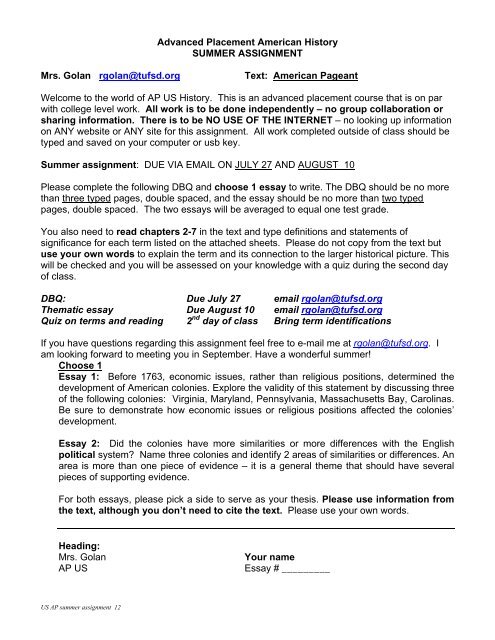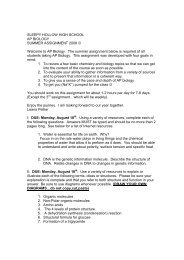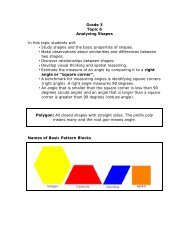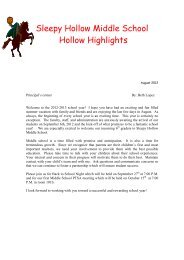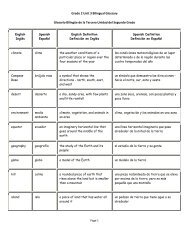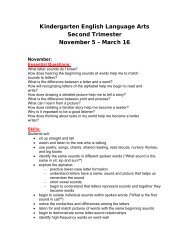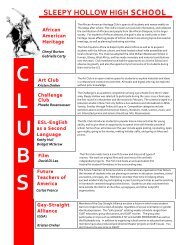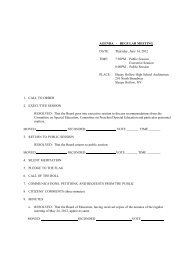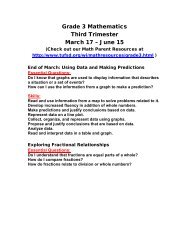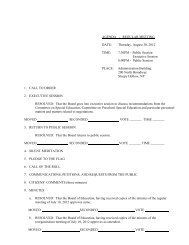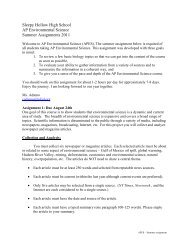Create successful ePaper yourself
Turn your PDF publications into a flip-book with our unique Google optimized e-Paper software.
US <strong>AP</strong> summer assignment 12<br />
Advanced Placement <strong>American</strong> <strong>History</strong><br />
SUMMER ASSIGNMENT<br />
Mrs. Golan rgolan@tufsd.org Text: <strong>American</strong> Pageant<br />
Welcome to the world of <strong>AP</strong> US <strong>History</strong>. This is an advanced placement course that is on par<br />
with college level work. All work is to be done independently – no group collaboration or<br />
sharing information. There is to be NO USE OF THE INTERNET – no looking up information<br />
on ANY website or ANY site for this assignment. All work completed outside of class should be<br />
typed and saved on your computer or usb key.<br />
Summer assignment: DUE VIA EMAIL ON JULY 27 AND AUGUST 10<br />
Please complete the following DBQ and choose 1 essay to write. The DBQ should be no more<br />
than three typed pages, double spaced, and the essay should be no more than two typed<br />
pages, double spaced. The two essays will be averaged to equal one test grade.<br />
You also need to read chapters 2-7 in the text and type definitions and statements of<br />
significance for each term listed on the attached sheets. Please do not copy from the text but<br />
use your own words to explain the term and its connection to the larger historical picture. This<br />
will be checked and you will be assessed on your knowledge with a quiz during the second day<br />
of class.<br />
DBQ: Due July 27 email rgolan@tufsd.org<br />
Thematic essay Due August 10 email rgolan@tufsd.org<br />
Quiz on terms and reading 2 nd day of class Bring term identifications<br />
If you have questions regarding this assignment feel free to e-mail me at rgolan@tufsd.org. I<br />
am looking forward to meeting you in September. Have a wonderful summer!<br />
Choose 1<br />
Essay 1: Before 1763, economic issues, rather than religious positions, determined the<br />
development of <strong>American</strong> colonies. Explore the validity of this statement by discussing three<br />
of the following colonies: Virginia, Maryland, Pennsylvania, Massachusetts Bay, Carolinas.<br />
Be sure to demonstrate how economic issues or religious positions affected the colonies’<br />
development.<br />
Essay 2: Did the colonies have more similarities or more differences with the English<br />
political system? Name three colonies and identify 2 areas of similarities or differences. An<br />
area is more than one piece of evidence – it is a general theme that should have several<br />
pieces of supporting evidence.<br />
For both essays, please pick a side to serve as your thesis. Please use information from<br />
the text, although you don’t need to cite the text. Please use your own words.<br />
Heading:<br />
Mrs. Golan Your name<br />
<strong>AP</strong> US Essay # _________
Chapter 2<br />
1. primogeniture<br />
2. joint stock company<br />
3. indentured servant<br />
4. Maryland Toleration Act<br />
5. Jamestown<br />
6. slave codes<br />
7. Virginia House of Burgesses<br />
8. Yamasee Indians<br />
9. Powhatan<br />
10. Sir Walter Raleigh<br />
11. Roanoke<br />
12. Lord Baltimore<br />
13. James Oglethorpe<br />
Chapter 3<br />
1. predestination<br />
2. proprietary colonies<br />
3. roger Williams<br />
4. Anne Hutchinson<br />
5. Wampanoag Indians<br />
6. King Philips War<br />
7. Metacom<br />
8. William Penn<br />
9. John Winthrop<br />
10. new England Confederation<br />
11. John Cotton<br />
12. Puritans<br />
13. Quakers<br />
14. Dutch West India Company<br />
15. Separatists<br />
16. Great Migration<br />
Chapter 4<br />
1. headright<br />
2. Bacon’s Rebellion<br />
3. middle passage<br />
4. Half Way Covenant<br />
5. Salem Witch Trials<br />
6. Stono Rebellion<br />
7. Leisler’s Rebellion<br />
8. indentured servants<br />
9. Bacon’s Rebellion<br />
10. Royal African Company<br />
Chapter 5<br />
1. Great Awakening<br />
2. Zenger Trial<br />
3. triangle trade<br />
4. power of the purse<br />
5. Paxton Boys and Regulators<br />
6. Anglican Church<br />
US <strong>AP</strong> summer assignment 12<br />
7. Jonathan Edwards<br />
8. Phillis Wheatley<br />
9. John Copley<br />
Chapter 6<br />
1. Albany Congress<br />
2. French and Indian War<br />
3. Treaty of Paris<br />
4. Proclamation of 1763<br />
5. Letters from a Farmer in Pennsylvania<br />
6. William Pitt<br />
7. New France<br />
Chapter 7<br />
1. mercantilism<br />
2. admiralty courts<br />
3. virtual representation<br />
4. mulatto<br />
5. salutary neglect<br />
6. Quebec Act<br />
7. Intolerable Acts<br />
8. Boston Tea party<br />
9. First Continental Congress<br />
10. Boston Massacre<br />
11. Gaspee Affair<br />
12. Tory<br />
13. Whig<br />
14. George Grenville<br />
15. Sons of Liberty<br />
16. Quartering Act<br />
17. Townshend Acts<br />
18. committee of correspondence<br />
Example:<br />
Term Date Definition and connection<br />
House of 1619 First type of democratic<br />
Burgesses government established in<br />
colonies. It was a colonial<br />
assembly, or mini-parliament.
US <strong>AP</strong> summer assignment 12


